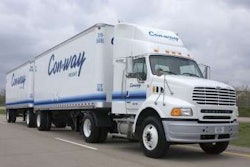The U.S. Court of Appeals for the Ninth Circuit on Friday, March 20, ruled in favor of the American Trucking Associations in its lawsuit seeking an injunction against the ports of Los Angeles and Long Beach concession plans. The three-judge panel ruled unanimously to remand the case to the U.S. District Court and indicated that the judge should grant ATA an injunction against all or part of the concession plans.
“In short, motor carriers should not be required to adhere to the various unconstitutional provisions in the Ports’ (concession) agreements, and are likely to suffer irrevocably if forced to do that or give up their businesses,” the court’s opinion said. ATA had not challenged the ports’ Clean Truck Program (CTP), which bans older trucks and uses a container fee to subsidize the purchase of newer, cleaner trucks.
“We are extremely pleased with the decision,” says Robert Digges Jr., ATA vice president and chief counsel. “The judges understood that most of the elements of the plans are not about safety, but rather are a regulatory effort by the ports to create what they believe would be a more efficient drayage system.”
As of Oct. 1, 2008, any motor carrier out of compliance with a port’s concession agreement had been barred from entering that port, a situation ATA argued has caused motor carriers to suffer both short- and long-term capital losses and injuries to business goodwill.
“The court clearly understood the plight of the motor carriers and the no-win situation that the concession plans present them — refuse to comply and lose their customers and possibly their businesses, or comply and bear the costs of totally restructuring their business model,” Digges says.
The appeals court’s instructions to the federal district court made clear that many elements of the concession plans must be enjoined, but leaves it to the federal district court as to whether the entire concession plans should be halted.
The appeals court particularly was troubled by the Port of Los Angeles’ concession agreement, saying it is “the most disruptive and is likely to cause the most harm.” The key difference between the two is that the Los Angeles concession agreement forces motor carriers to phase out their use of independent contractors. If the Port of Los Angeles was able to proceed with that measure pending litigation, “the carrier will be forced to incur large costs which, if it manages to survive those, will disrupt and change the whole nature of its business in ways that most likely cannot be compensated with damages alone,” the appeals court ruled.
“That requirement is dead,” says Curtis Whalen, executive director of ATA’s Intermodal Motor Carrier Conference (IMCC), referring to the Los Angeles port’s independent contractor stipulation. The Port of Long Beach concession plan did not ban owner-operators.
Both concession agreements also require numerous financial disclosures from motor carriers, including annual reports, Securities and Exchange Commission filings, balance sheets, income tax statements and pending legal actions. The appeals said it was unlikely that the financial disclosure requirements in both ports’ agreements could be justified “under any conceivable safety rationale.” The court likewise faulted a provision in the Port of Long Beach agreement requiring motor carriers to notify drivers of available health insurance. “Again, this has no discernable safety purpose.”
Digges says ATA will work expeditiously with the federal district court to structure an injunction that implements the decision and protects the interests of the motor carrier industry. The appeals court decision said it would not entertain any petition for rehearing, although the ports could appeal to the U.S. Supreme Court.
The CTP is part of a massive five-year Clean Air Action Plan to reduce port truck emissions at the San Pedro Bay ports by 80 percent and emissions from all sources by 45 percent. Beginning Oct. 1, 2008, the ports banned the most polluting trucks — 1988 and older vehicles — the initial ban in a series planned under the CTP. On Jan. 1, 2010, the ports will ban 1993 and older trucks, and unretrofitted model year 1994 to 2003 trucks. By January 2012, all vehicles 2006 and older will be banned.
The Federal Maritime Commission on Feb. 11 decided to allow the ports to begin collecting fees from port operators under the PortCheck Agreement of the ports’ joint CTP after meeting and discussing anticompetitive concerns associated with the CTP. FMC also currently is pursuing an injunction under section 6 of the Shipping Act against certain aspects of the CTP in the U.S. District Court for the District of Columbia.
The PortCheck Agreement, as one part of a related web of agreements, implements the harmonized CTP, which FMC has determined is likely, by a reduction in competition, to result in an unreasonable reduction in transportation services and an unreasonable increase in transportation cost. FMC said Feb. 11 that in light of the previously filed action targeting the most anticompetitive provisions of the CTP, it determined that it is unnecessary to separately enjoin operation of the PortCheck Agreement and fee collection.
The City of Los Angeles said it was pleased that the centerpiece components of the CTP that are currently in effect — i.e., the dirty truck ban and clean truck fee — remain intact. “Our Clean Truck Program is reducing toxic port truck pollution at an accelerated pace, and today’s ruling by the Ninth Circuit Court of Appeals does not challenge the truck ban schedule or truck fees that are helping us successfully battle this health crisis,” said Los Angeles Mayor Antonio Villaraigosa. “We are committed to fighting this case, because our Clean Truck Program is the most sustainable plan for ensuring a clean, safe and secure trucking system for the long haul at the Port of Los Angeles.”











